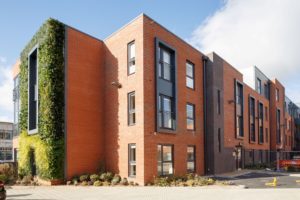 Orbit Housing’s Fordham House in Stratford-upon-Avon aims to raise the bar for rented accommodation. Designed for key workers in the town, the 82-apartment block will provide enhanced protection against noise, a superior maintenance and repair strategy and additional facilities such as secure internal bike storage rooms.
Orbit Housing’s Fordham House in Stratford-upon-Avon aims to raise the bar for rented accommodation. Designed for key workers in the town, the 82-apartment block will provide enhanced protection against noise, a superior maintenance and repair strategy and additional facilities such as secure internal bike storage rooms.
Much of the budget for these above-and-beyond features has come from the specification of Modus PVC-U windows from Eurocell in place of the aluminium frames originally specified. “We saved a significant amount without compromising on the specification or the design”, says Orbit Commercial Director Adam Cooper. “And from a planner’s point of view, they look identical”.
Deeley Construction began work on the site, which sits on the corner of Birmingham and Clopton Roads, with the demolition of a disused office building. Construction of the foundations began in May 2016, with the first tenants moving into their new homes in September 2018. Deeley’s parent company is one of three partners that form the scheme’s developer ABD Developments, and the site itself is owned by benevolent organisation Stratford Town Trust.
Constructed from dense concrete blocks with hollowcore flooring, the three- and four-storey building is clad in a mixture of curtain walling and green wall – sections of planted walls which will be automatically fed and irrigated. The Modus windows, supplied are tilt-and-turn so that they can be cleaned internally, avoiding the potential hazard and traffic issues of accessing them from the elevations by the two busy roads.
Tenants will be required to keep their windows clean as part of their tenancy agreement. Details about how to operate and clean the windows, together with a function that allows tenants to report and photograph any problems with their apartments, will be available through a smartphone app, developed by Orbit.
With many tenants expected to come from expanding local hospitals, acoustic improvements were high on the menu of potential value-enhancing features. Orbit has beefed up the acoustic barriers between floors with a layer of insulation and screed with suspended ceilings added to the deep hollow concrete slab. It has also added fitted blinds within the reveals of the windows to provide an additional noise cushion for shift workers who need to sleep during the day.
“We did not need to increase the specification for the windows: the existing specification from Eurocell provided the level of acoustic protection that we needed”, says Cooper.
Coming with a 12-year guarantee, the Modus system is available in nine solid and woodgrain-effect colours, all of which are available with white internal finishes to create a light and airy living environment. A further range of more than 40 solid and woodgrain effect finishes is available, including colour both sides.
BBA-certified to function satisfactorily for more than 35 years, the Modus range achieves a U-value of 1.2 W/m² using 4/20/4 mm using sealed double-glazed units. This effective thermal performance is due to the 75mm six-chamber profile system used in the Modus that also enables the range to achieve a U-value of 0.7 by installing triple-glazed units.
This led to Modus becoming one of the very first systems to achieve the BFRC Window Energy Rating (WER) of A++. This is only awarded to windows with an energy index value equal to or greater than +20; and Modus A++ designs include casement, reversible and tilt and turn.
Consisting of 50% post-consumer recycled PVC-U as standard, Modus has a smaller carbon footprint than products made or recycled outside of the UK. Eurocell achieves this by employing dual material extrusion technology (DMET) that layers post-consumer recycled and ‘virgin’ material simultaneously, so the recycled material is concentrated in the central core of the profiles where it cannot be seen once the door or window is installed.
Additional budget gained from savings on the window costs has also gone into upgrading the flooring material. Ceramic wood-effect flooring has replaced lino to provide a longer life and hence lower maintenance costs and down-time for Orbit.
A re-think of the building’s layout produced space for a substantial ‘spares room’ which will house items such as cookers and kitchen units. With all the apartments kitted out identically, this will enable faster repairs and reduce the time required to spruce up homes between tenancies.
With a background in both construction and maintenance of multi-tenanted buildings, Cooper has a better understanding than most of how decisions taken at the construction phase impact on the experience of those who live in it. “It’s all about giving our tenants the best customer experience we can”, he explains.
To simplify specification, Modus BIM models are available to download for free from the Eurocell website at http://www.eurocell.co.uk/bim

